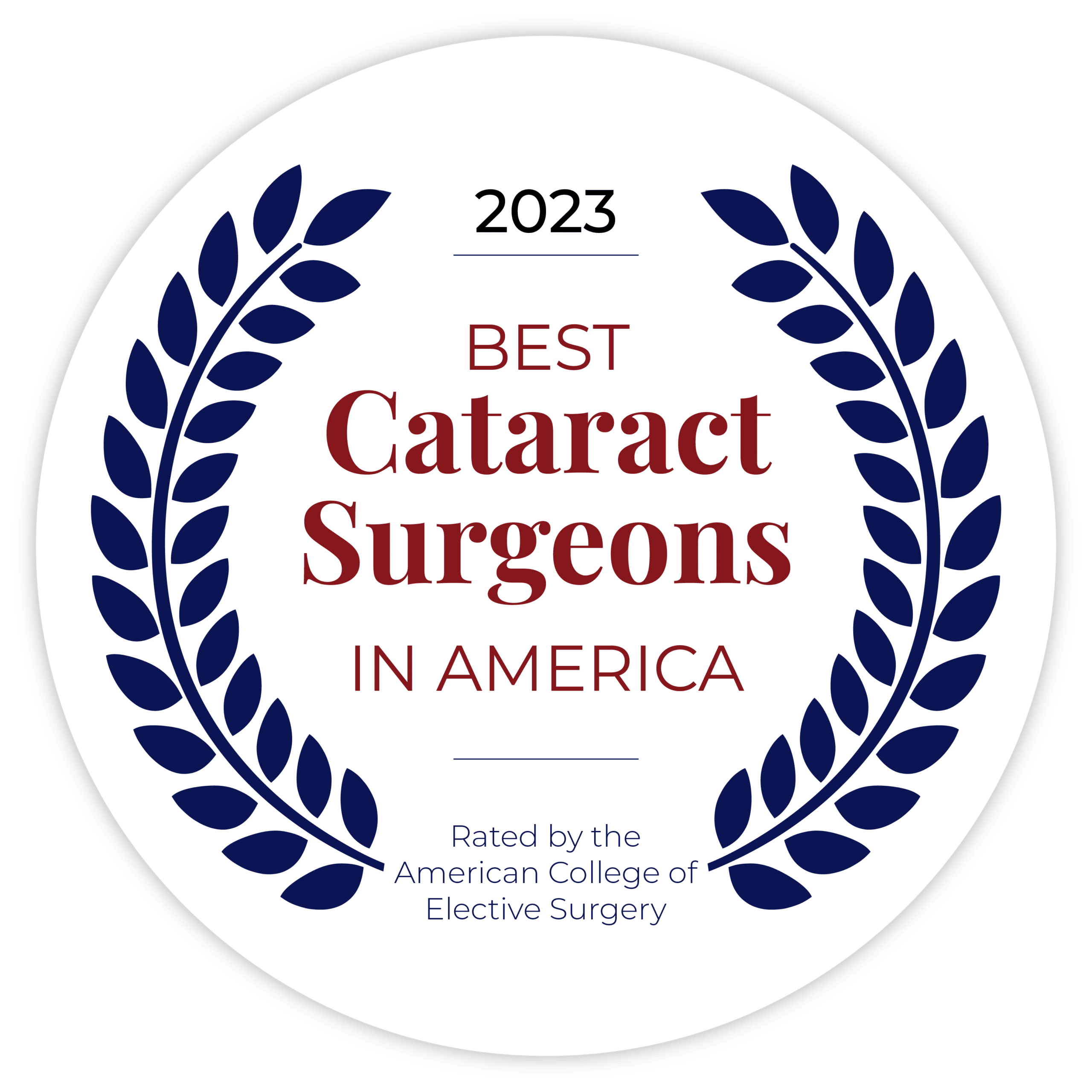Cataract Surgery in New York City & Manhattan
Dr. Pamel now offers laser cataract eye surgery with the Optimedica Catalys Precision Laser Platform femtosecond cataract system. One of the first New York cataract surgeons to adopt this technology, Dr. Pamel is able to completely customize cataract surgery to the needs of the individual patient for enhanced results. The femtosecond laser is used to perform the first few steps of the cataract removal procedure, including the initial incisions, capsulotomy and phacoemulsification. Learn more about Laser Cataract Surgery.
What is a Cataract?
 A cataract is a clouding of the natural lens that can occur with aging, certain medical conditions, the use of certain medications, and trauma. In some instances this condition is hereditary. When the cloudy lens interferes with a person’s lifestyle (such as during reading, driving, or watching television), the treatment involves removal of the cataracts through a micro-incision. An IOL is then used to restore vision. Dr. Pamel is a LASIK specialist who is also adept at IOL procedures. Our office performs such operations with intraocular lenses, and we have helped countless patients obtain clear vision.
A cataract is a clouding of the natural lens that can occur with aging, certain medical conditions, the use of certain medications, and trauma. In some instances this condition is hereditary. When the cloudy lens interferes with a person’s lifestyle (such as during reading, driving, or watching television), the treatment involves removal of the cataracts through a micro-incision. An IOL is then used to restore vision. Dr. Pamel is a LASIK specialist who is also adept at IOL procedures. Our office performs such operations with intraocular lenses, and we have helped countless patients obtain clear vision.
Cataract Consultation
Prior to an IOL operation at our office, Dr. Pamel and his staff will take measurements of your eyeball in order to determine the strength of the lens implant. Determining the precise power of the lens implant is critical because the implant will determine if you will require spectacles to correct the vision problems following the cataracts operation.
These procedures have undergone numerous advancements in the last decade, which have not only made the procedure faster but have also shortened the length of recovery time. The cataract is removed using ultrasound to break up the natural lens. This procedure is called phacoemulsification.
As an experienced cataract surgeon, Dr. Gregory Pamel uses a technique that usually does not require patching of the eyeball or stitches. The surgical procedure takes only 10 minutes and is done in an outpatient operation center setting. Our office will be able to provide transportation to and from your home the day of your operation in most cases.
Intraocular Lens Options for Lens Implant Surgery
There are currently two different types of intraocular lenses available to patients undergoing this procedures at our office.
Monofocal Lens Implants
The most common intraocular lens we offer at our office is a monofocal lens implant. This intraocular lens will correct a patient’s distant vision or near vision depending on the power of the implant. Most of the time, Dr. Gregory Pamel selects an implant power to correct the patient’s distance vision completely so that after the operation, the patient will only have to wear reading spectacles.
Multifocal Lens Implants
The other type of intraocular lens at our office is a multifocal lens implant. This intraocular lens can correct a patient’s distance and reading vision making the patient less dependent on reading spectacles. Prior to the procedure, you and the doctor will spend time discussing the two types of implants so that an informed decision can be made regarding which type of intraocular lens should be used.
Cataract Surgery FAQs
When is the right time to have cataract surgery?
Most patients wait until their vision becomes significantly cloudy before opting for cataract surgery. However, there’s no such thing as having surgery too early. Cataracts are progressive and will not improve on their own. Once they interfere with your daily activities like reading, driving, or watching TV, it’s a good time to consider surgery.
Will I have to wear glasses after cataract surgery?
Your need for glasses after surgery largely depends on the type of intraocular lens (IOL) you choose. Premium lenses such as monofocal, multifocal, accommodating, and toric lenses can significantly reduce your dependence on glasses or contacts.
At what age can I expect to develop cataracts?
While cataracts can technically develop at any age due to genetics or medical conditions, most people start experiencing symptoms in their 60s or 70s. About half of Americans have cataracts by the age of 75.
Is cataract surgery painful?
Cataract surgery is generally not painful. Most patients feel only mild pressure during the procedure thanks to numbing eye drops and light sedation. After surgery, some irritation or scratchiness is normal but typically resolves quickly.
How long does it take to recover from cataract surgery?
Many patients notice clearer vision within 24 to 48 hours after surgery. However, complete recovery can take about 4 to 6 weeks. Dr. Pamel will guide you through each step of the healing process and monitor your progress during follow-up visits.
Can cataracts come back after surgery?
No, cataracts cannot return after surgery because the cloudy natural lens has been permanently replaced with an intraocular lens. However, a condition called posterior capsule opacification (PCO) can occasionally cause cloudy vision later on, but it’s easily treatable with a quick laser procedure.
What are the risks or complications of cataract surgery?
Cataract surgery is extremely safe, but like any surgery, it carries some risks, such as infection, inflammation, or retinal detachment. Dr. Pamel’s extensive experience and careful technique help minimize these risks and ensure optimal outcomes.
Can I have cataract surgery on both eyes at the same time?
Typically, cataract surgery is performed on one eye at a time. Once the first eye has healed and your vision stabilizes, usually after a few weeks, the second eye can be treated.
What should I avoid after cataract surgery?
After surgery, you should avoid heavy lifting, strenuous exercise, rubbing your eyes, swimming, or exposure to dust and dirty environments. Dr. Pamel will give you detailed instructions to protect your healing eyes.
How do I choose the right intraocular lens (IOL)?
Choosing the right lens depends on your lifestyle and vision goals. Dr. Pamel will discuss your options — including monofocal, multifocal, and toric lenses — and help you decide which one best fits your needs.
Will insurance cover cataract surgery?
Basic cataract surgery with a standard monofocal IOL is typically covered by insurance and Medicare. If you opt for premium lens upgrades or laser-assisted surgery, there may be some additional out-of-pocket costs. Our team will help you understand your coverage and financing options.

 Gregory J. Pamel, M.D.
Gregory J. Pamel, M.D.
Dr. Pamel was recently honored as a board-certified fellow in the inaugural class of the World College of Refractive Surgery and Visual Sciences. Dr. Pamel was among 1000 surgeons worldwide out of 280,000 ophthalmologists to be unanimously selected for this achievement. He was recognized for his surgical expertise and contribution to the education and advancement of Refractive surgery over the last twenty years. This honor is a testament to Dr. Pamel's commitment to provide the highest quality vision correction surgery. Read more.





Why choose Dr. Pamel?
At Pamel Vision and Laser Group, we recognize that every patient’s eyes — and goals for vision — are unique. Dr. Pamel personally oversees each cataract evaluation to ensure that the best technology and lens options are selected based on your individual lifestyle and vision needs. Whether you’re hoping to read without glasses, drive comfortably at night, or reduce your dependence on corrective lenses altogether, Dr. Pamel tailors your cataract surgery plan to help you achieve your ideal outcome.
Patients choose Dr. Pamel not only for his decades of experience but also for his dedication to using the most advanced surgical techniques and laser technology available today. He believes that clear communication, a personalized approach, and a genuine investment in patient care are just as important as surgical precision.
Dr. Pamel has performed over 4,000 cataract surgeries and is trusted by other physicians throughout the region to handle complex and difficult cases. Many doctors regularly refer their patients to him for cataract surgery, including patients from Astoria, Queens, Manhattan, and beyond. His reputation for excellence and his careful, personalized approach have made him a top choice for cataract surgery in New York City.
As a leading cataract surgeon, Dr. Pamel is committed to making your journey as smooth and stress-free as possible — from the initial consultation through your final follow-up visit. Many of his patients comment on how comfortable and informed they felt throughout the entire process.
If you are noticing changes in your vision or have been told you have cataracts, Dr. Pamel invites you to schedule a personal consultation to discuss your options. Together, you can develop a plan to restore your vision and improve your quality of life.
Call our office today at (212) 355-2215 to schedule a consultation. For more information on implantable contact lenses, contact our office today.





